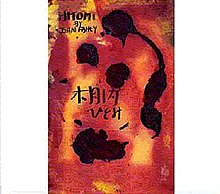
Henry John Deutschendorf Jr., known professionally as John Denver, was an American singer-songwriter, record producer, actor, activist, and humanitarian, whose greatest commercial success was as a solo singer. After traveling and living in numerous locations while growing up in his military family, Denver began his music career with folk music groups during the late 1960s. Starting in the 1970s, he was one of the most popular acoustic artists of the decade and one of its best-selling artists. By 1974, he was one of America's best-selling performers, and AllMusic has described Denver as "among the most beloved entertainers of his era".
Charley Patton, also known as Charlie Patton, was an American Delta blues musician. Considered by many to be the "Father of the Delta Blues", he created an enduring body of American music and inspired most Delta blues musicians. The musicologist Robert Palmer considered him one of the most important American musicians of the twentieth century.

The Transfiguration of Blind Joe Death is a 1965 album by American fingerstyle guitarist and composer John Fahey. Originally issued in a hand-lettered edition of 50, it was Fahey's first album to be released by a label other than his own Takoma Records. As with all of Fahey's independently released early albums, it had little critical recognition upon release. The album has grown in stature since its reissue on CD in 1997 and is now highly regarded critically. It was Fahey's fourth album to see release, though after his fifth album, The Great San Bernardino Birthday Party & Other Excursions, was labeled Guitar Vol. 4, reissues of The Transfiguration of Blind Joe Death were subtitled John Fahey, Volume 5.

John Aloysius Fahey was an American fingerstyle guitarist and composer who played the steel-string acoustic guitar as a solo instrument. His style has been enormously influential and has been described as the foundation of American Primitive Guitar, a term borrowed from painting and referring mainly to the self-taught nature of the music and its minimalist style. Fahey borrowed from the folk and blues traditions in American roots music, having compiled many forgotten early recordings in these genres. He would later incorporate 20th-century classical, Portuguese, Brazilian, and Indian influences into his work.

The Voice of the Turtle is the seventh album by American guitarist John Fahey. Recorded and released in 1968, it is considered one of his more experimental albums, combining not only folk elements, but shreds of psychedelia, early blues, country fiddles, ragas, and white noise. The album had many reissues with various track listings, jacket designs and mismatched titles.

Nite Flights is the sixth and last studio album by the American pop group The Walker Brothers, released in July 1978. Unlike their previous two albums which consisted almost entirely of cover versions, each member of the group wrote songs for Nite Flights; two by Gary Walker with Scott Walker and John Walker each contributing four. "The Electrician" was released as a single from the album. The four Scott-penned tracks were released on that year's Shutout EP.

The Yellow Princess is the ninth album by American folk musician John Fahey. Released in 1968, it was his second and last release on the Vanguard label.

Death Chants, Breakdowns & Military Waltzes is a 1963 album by American fingerstyle guitarist and composer John Fahey. Various sources show either a 1963 or 1964 original release. It was Fahey's second release and the first to gain a national distributor.
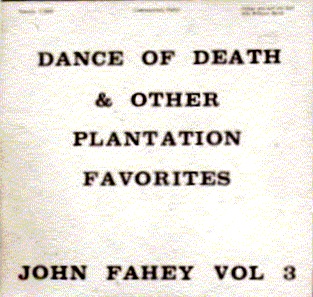
The Dance of Death & Other Plantation Favorites is the third album by American fingerstyle guitarist and composer John Fahey, released in 1965. The 1999 reissue contained four previously unreleased tracks.
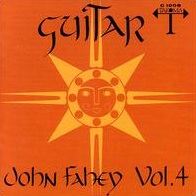
The Great San Bernardino Birthday Party & Other Excursions is an album by American fingerstyle guitarist and composer John Fahey, released in 1966. The cover simply labels the album Guitar Vol. 4 while the liner notes label it The Great San Bernardino Birthday Party & Other Excursions. The title never appeared on the record labels themselves. It marked the beginning of Fahey's interest in his recording of experimental soundscapes and sound effects. Despite Fahey's distaste for the 1960s counterculture, it is his release most often referred to as psychedelic.
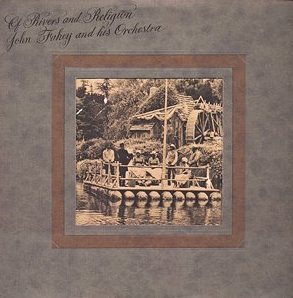
Of Rivers and Religion is an album by American folk musician John Fahey, released in 1972. It was his first recording on a major label and is credited to John Fahey and His Orchestra. It marked a significant change from Fahey's previous releases, incorporating a backing band and performing songs and arrangements in a Dixieland jazz style. Although Time picked it as one of the Top Ten albums of 1972, it was also a difficult album to market and had little enthusiasm at Reprise.

After the Ball is an album by the American folk musician John Fahey, released in 1973. It was his second and last recording on the Reprise label and like its predecessor, Of Rivers and Religion, it sold poorly.
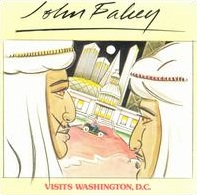
John Fahey Visits Washington D.C. is an album by American fingerstyle guitarist and composer John Fahey, released in 1979.

God, Time and Causality is an album by American fingerstyle guitarist and composer John Fahey, released in 1989.

Red Cross is an album by American fingerstyle guitarist and composer John Fahey, released posthumously in 2003. The Revenant Records catalog refers to the album's title as Red Cross Disciple of Christ Today.

Railroad is an album by American fingerstyle guitarist and composer John Fahey, released in 1983. It was originally released as Railroad 1 by mistake. The Shanachie Records reissue is correctly labeled as Railroad. It was his last principal recording for Takoma Records, the label he founded in 1959.
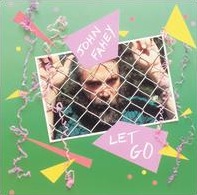
Let Go is an album by American fingerstyle guitarist and composer John Fahey, released in 1984. It was his first release on the Varrick label after over 25 years on his own label Takoma, as well as a few releases on other labels.
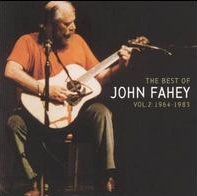
The Best of John Fahey, Vol. 2: 1964–1983 is a compilation album by American fingerstyle guitarist and composer John Fahey, released in 2004.

Spirit is the tenth studio album by Japanese singer and songwriter Hitomi. It was released on April 27, 2011, through independent label Maximum 10. It is her first not to be handled by Avex Trax, though both are owned by the same operating company. Spirit is described as "electro-oriented club music married with emo rock"; produced by Advanced Alternative Media, the album is noted as "their first collaboration with a Japanese artist".

Terry Robb is a Canadian fingerstyle guitarist, composer, arranger and record producer living in the United States. He plays electric and acoustic guitar, and is associated with the American Primitive Guitar genre through his collaboration with steel string guitarist John Fahey. He is a member of the Oregon Music Hall of Fame and Cascade Blues Association Hall of Fame, and was honored with the eponymous "Terry Robb" Muddy Award for Best Acoustic Guitar in 2011. His original compositions draw on the Delta blues, ragtime, folk music, country music and jazz traditions.
